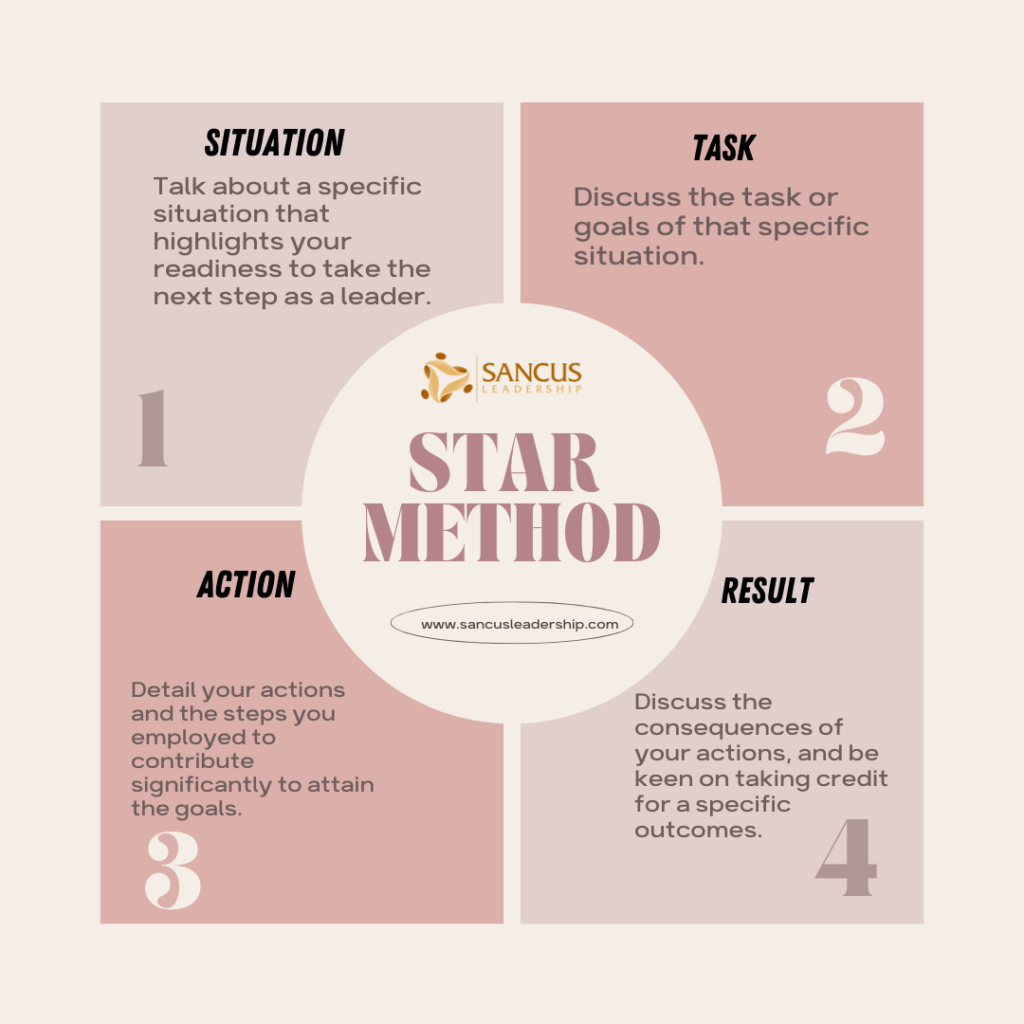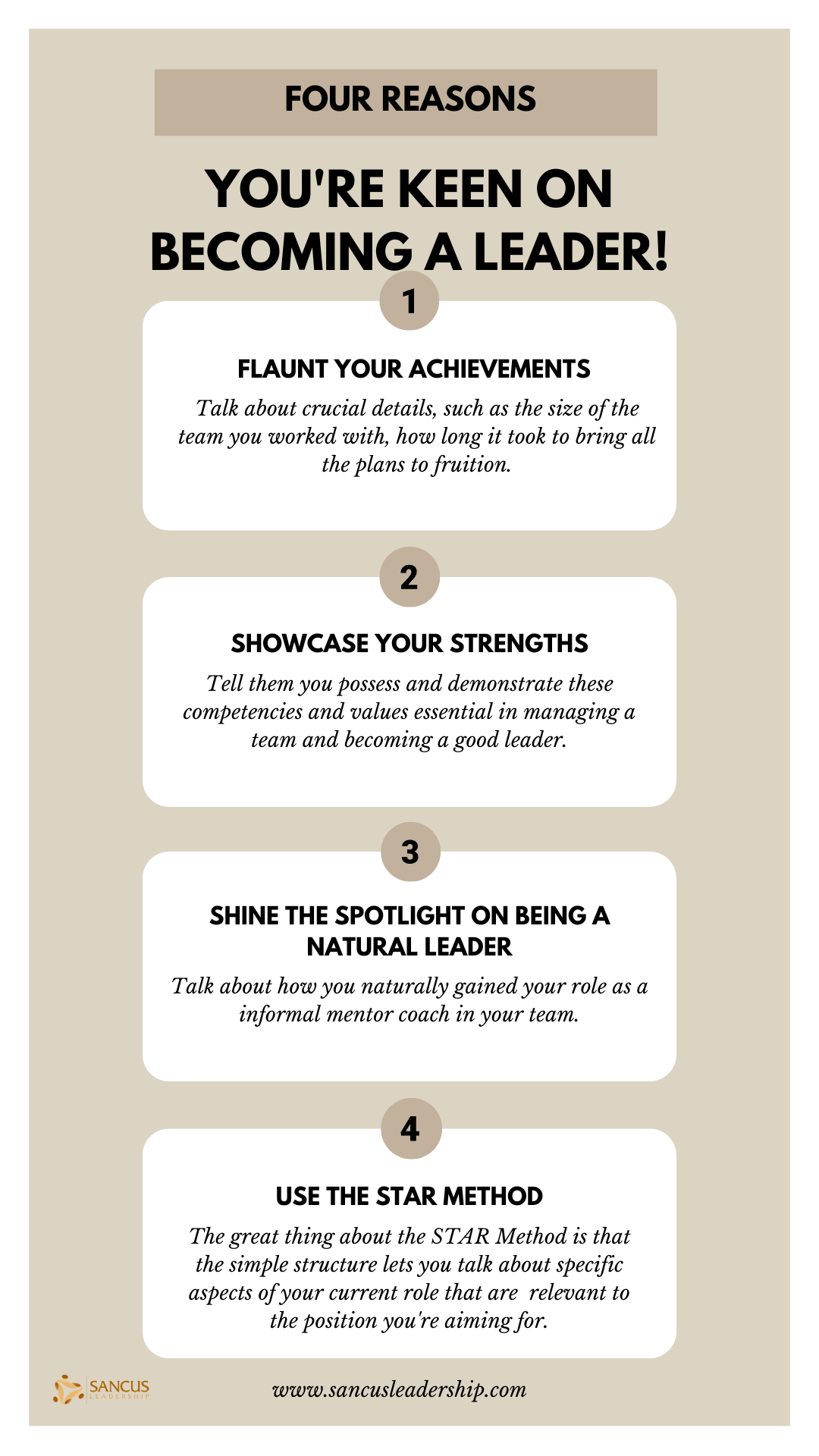Your cart is currently empty!

How To Say You’re Ready for a Leadership Role!
We all want to progress in our careers, and when you know you’re ready to take a step higher up the corporate ladder, don’t hesitate to let your intentions and wishes be heard, especially if you’ve put in the hard work. Being vocal about your readiness to take on a leadership role takes courage. Knowing the right words to say and how to tell them will significantly impact how management will accept your sentiments.
Tell them you’re ready for leadership by being precise, direct, and transparent. Aim to highlight specific scenarios where your leadership qualities shone through. Avoid long-winded conversations where irrelevant and unnecessary information is shared.
We will discuss how highlighting specific competencies, experiences, and values can contribute to painting a picture of you as a proficient, effective, and capable leader. We will also discuss the merits of the STAR Method — a simple structure to get your messages across more clearly and effectively. Stick around for tips on how to say you’re ready for that promotion.
Want to become a manager? Find out if the team leader role is really worth it!
What To Say When You’re Keen on Becoming a Leader

Let them know you’re ready to be a leader by talking about the values and skills you’ve acquired through various opportunities that have come your way—zone in on specific examples that display your leadership prowess. Utilize the STAR Method to structure your discussion conclusively.
Let them know you’re ready to be a leader by talking about the values and skills you’ve acquired through various opportunities that have come your way.
A leader is someone proficient in leading their team toward common goals. They can effectively manage various situations, including conflicts and failure, so the team remains motivated, collaborative, and productive.
A leader is someone proficient in leading their team toward common goals.
If you’re confident that you have what it takes to take your career to the next level, here are some ideas you might consider saying to get that much-awaited promotion:
1. Flaunt Your Achievements
“The success of Projects X, Y, and Z, which I spearheaded, explicitly show that I’m ready for a leadership role in the company.”
Talk about projects you spearheaded, particularly those that have significantly impacted the company and given you opportunities to showcase your leadership potential. Highlight aspects that are relevant to the specific role you are eying for.
Talk about crucial details, such as the size of the team you worked with, how long it took to bring all plans to fruition, how you ensured seamless collaboration within the team, and your specific responsibilities and contributions.
Doing so will give management a clearer idea of your brand of leadership. These details will help them determine if you’re a good fit for the leadership position you’re aiming for.
2. Showcase Your Strengths
“My track record, extensive experience, and credibility speak for themselves and are, in my opinion, substantial grounds for you to consider me for a leadership role.”
Leaders possess competencies and values that set them apart from the rest of the team. These include:
- Excellent communication abilities
- Strong conflict resolution skills
- Adeptness in sound decision-making
- Ability to inspire others
- Strong commitment to the team
- Great credibility
- High sense of integrity
- Admirable work ethics
Tell them you possess and demonstrate these competencies and values essential in managing a team and becoming a good leader. Cite specific instances when these became apparent to show them how you exhibit and utilize these traits for the team’s benefit.
A friend has been eying a leadership role in his company for quite some time now and was pushed to finally make a move when the company relocated to a bigger office. He took his chance and scheduled an appointment with his superior. He talked about a recent instance when their team leader took a break from work to go on vacation, and an angry client threatened to cut ties with the team because of a simple miscommunication.
He talked about how he pacified the client who stormed into the office early one morning, highlighting how he was professional, firm yet concerned, and empathetic to the client’s needs and frustrations. He also discussed how he brainstormed with his teammates on the options they could offer the client to appease his anger, eventually coming up with a solution that made the client realize that the issue was just a simple and unintentional oversight.
He then offered a written recommendation from his superior, where his leader highlighted his initiatives in helping to resolve the problem. Management was glad they knew who to give credit to for solving that chaos, and they offered him a leadership role the following month.
3. Shine the Spotlight on Being a Natural Leader
“I play informal mentoring roles in the team, with most of my teammates frequently asking me for advice on tackling various situations. I think it’s about time we formalize this arrangement.”
Talk about how you naturally gained your role as an informal mentor or coach in your team. Let them know how your teammates instinctively turn to you for advice in handling technical issues and navigating through tricky situations, especially when your leader isn’t around.
Emphasize that you like leading your teammates, and you get a sense of fulfillment when you help them improve their skills, enhance their experiences, influence them to strive for excellence and expose them to opportunities for growth.
I remember an ex-colleague who was exceptionally good at adjusting his communication style based on the personality of the person he was talking to. His leader saw this unique trait in him and would often turn to him for assistance in effectively influencing the team to be receptive to new rules and guidelines. His teammates also warmed up to him and began seeking him for his input and ideas.
Eventually, when a leadership role opened, his leader recommended him to management, highlighting his potential and the significant role he’s been playing in the team. Management instantly saw how much of an asset he was to the business. They interviewed him, he expressed his eagerness to take his career further, and he promptly bagged the position.
4. Use the STAR Method
The STAR Method is a structured, effective way to respond to behavior-based questions to help you highlight relevant points in your career.
Let’s break down the acronym:
- Situation: Talk about a specific situation that highlights your readiness to take the next step in your career — leadership. It has to be specific and relevant to your purpose.
- Task: Discuss the task or goal of that specific situation.
- Action: Detail your actions and the steps you employed to contribute significantly to attaining the goals. Avoid using “we” since this connotes team effort, and always use “I” to shine the spotlight on your roles and contributions.
- Result: Discuss the consequences of your actions, and be keen on taking credit for specific outcomes.

The great thing about the STAR Method is that the simple structure lets you talk about specific aspects of your current role that are relevant to the position you’re aiming for. It keeps you from rambling on and offering immaterial information about your goal. It will help you convey professionalism, efficiency, and assertiveness.

Here’s a video that can help you understand and think if you are finally ready to take on a leadership role.
Key Takeaways
Letting management know you’re ready to take on a leadership role is crucial for the advancement of your career. If you’re keen on that promotion, begin by putting together a list of relevant skills, values, and experiences, all of which can highlight your capacity to lead a team. Recall specific instances that showcase how you put your leadership abilities to good use.
Remember to always be specific, direct, and assertive in getting your message across. What you say and how you say it will be part of how they assess your readiness for a higher position in the company.
